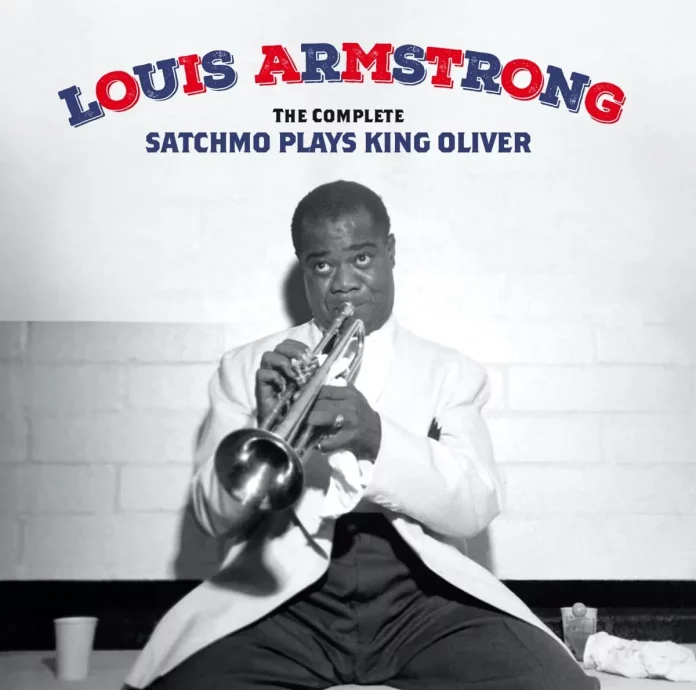Much of the playlist in this tribute album to King Oliver, once young Armstrong’s revered boss, mentor and inspiration, seems inappropriate, or tenuously connected. CD1 opens with the 14 tracks recorded at the 1959 studio session. Of the 12 tracks used on the LP (Snake Rag and New Orleans Stomp remained unissued), only Chimes Blues is revived from classic 1923 Armstrong recordings with Oliver. (This is an updated arrangement in All Stars style, as throughout the album, and works well, Billy Kyle’s descending chimes effectively linking the expressive solos.)
All the remaining tracks on CD1, and the whole of CD2, are bonus tracks. These consist of 10 known alternative takes and seven Oliver-related classic Armstrong recordings from 1926-29 on CD2, with various Armstrong recordings throughout from the 50s connected to a degree with Oliver. These include a memorable revival of West End Blues (written by Oliver) from 1955 (the Milan concert), and colourfully swinging, updated arrangements of Dippermouth Blues, Canal Street Blues and Snag It – all time-honoured Oliver tunes – from Armstrong’s “Musical Biography” recordings, which help to validate this album’s tribute theme. At the peak of his mature years, Armstrong sounds quite magnificent.
The original LP sleeve notes claim that all the tunes were chosen by Louis, but it’s been suspected that new record producer Sid Frey stipulated some public-domain tunes to side-step the costs of copyrighted Oliver material. When quizzed about selecting My Old Kentucky Home, Louis replied with characteristic disarming ingenuousness “Well, Joe might have played it..!” This “might have” approach extended to several other tunes, not least Hot Time In The Old Town Tonight and (really stretching it) Frankie and Johnny, which is performed as a solo Armstrong vocal throughout, backed only by honky-tonk piano.
For Armstrong’s 1959 sidemen, Oliver-era material was probably not very familiar, which may well have influenced the chosen repertoire, but it was comfortably enough restyled for All Star performance, and a break, of course, from their routine set concert programme. The group was very capable and experienced, well rehearsed in support, and all accomplished soloists. With Louis vibrant at the helm, there’s plenty to enjoy. St James Infirmary, slow and sombre, is a striking interpretation, Louis incredibly powerful in high register, as also in I Ain’t Got Nobody. And My Old Kentucky Home turns out to be a particularly lively and enjoyable track after all!
This release is more about King Louis than King Oliver, perhaps. The retro section in CD2 would have more appropriately included samples of young Armstrong’s astonishing rapport on second cornet with Oliver’s lead back in 1923. All caveats aside, however, enjoy further testimony to the great master in fine form on this welcome augmented reissue.
Discography
CD1: (1) St James Infirmary; Big Butter And Egg Man; I Ain’t Got Nobody; Panama Rag; Doctor Jazz; Hot Time In The Old Town Tonight; Frankie And Johnny; I Ain’t Gonna Give Nobody None Of This Jelly Roll; Drop That Sack; Jelly Roll Blues; My Old Kentucky Home; Chimes Blues; Snake Rag; New Orleans Stomp; (2) Dippermouth Blues; Canal Street Blues; Snag It; (3) High Society; (4) Riverside Blues; Dippermouth Blues; (5) West End Blues (76.29)
CD2: (6) St James Infirmary; Big Butter And Egg Man; I Ain’t Got Nobody; Panama Rag; Doctor Jazz; Hot Time In The Old Town Tonight; Drop That Sack; Jelly Roll Blues; My Old Kentucky Home; Chimes Blues (7) Weather Bird;(8) West End Blues; (9) St James Infirmary; (10) Big Butter And Egg Man; (11) I Ain’t Got Nobody; (12) Panama Rag; (10) DropThat Sack; (13) New Orleans Stomp (64.57)
Armstrong (t, c, v) on all tracks with full personnels.
(1) The All Stars. Trummy Young (tb); Peanuts Hucko (cl); Billy Kyle (p); Mort Herbert (b); Danny Barcelona (d). LA, 30 September and 1-2 October 1959.
(2) The All Stars plus guests. (Musical Autobiography album). NY, January 1957.
(3) The All Stars. NY, 12 December 1956.
(4) The Dukes Of Dixieland. Chicago, 3-5 August 1959.
(5) The All Stars. Milan, Italy, 20 December 1955.
(6) as (1), alternative takes.
(7) Earl Hines (p). Chicago, 5 December 1928.
(8) His Hot Five. Chicago, 28 June 1928.
(9) His Savoy Ballroom Five. Chicago, 12 December 1928.
(10) His Hot Five. Chicago, 16 November 1926.
(11) His Orchestra. NY, 10 December 1929.
(12) The All Stars. NY, 26 April 1950.
(13) Johnny Dodds’ Black Bottom Stompers. Chicago, 22 April 1927.
American Jazz Classics 99153
















